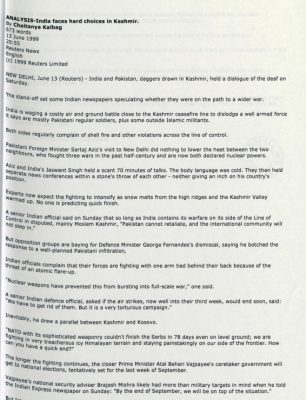ANALYSIS-India faces hard choices in Kashmir.
[Reuters]
Published date: 13th Jun 1999
13 June 1999
Reuters News
English
(c) 1999 Reuters Limited
NEW DELHI, June 13 (Reuters) – India and Pakistan, daggers drawn in Kashmir, held a dialogue of the deaf on Saturday.
The stand-off set some Indian newspapers speculating whether they were on the path to a wider war.
India is waging a costly air and ground battle close to the Kashmir ceasefire line to dislodge a well armed force It says are mostly Pakistani regular soldiers, plus some outside Islamic militants.
Both sides regularly complain of shell fire and other violations across the line of control.
Pakistani Foreign Minister Sartaj Aziz’s visit to New Delhi did nothing to lower the heat between the two neighbours, who fought three wars in the past half-century and are now both declared nuclear powers.
Aziz and India’s Jaswant Singh held a scant 70 minutes of talks. The body language was cold. They then held separate news conferences within a stone’s throw of each other – neither giving an inch on his country’s position.
Experts now expect the fighting to intensify as snow melts from the high ridges and the Kashmir Valley warmed up. No one is predicting quick finish.
A senior Indian official said on Sunday that so long as India contains its warfare on its side of the Line of Control in disputed, mainly Moslem Kashmir, “Pakistan cannot retaliate, and the international community will not step in.”
But opposition groups are baying for Defence Minister George Fernandes’s dismissal, saying he botched the response to a well-planned Pakistani infiltration.
Indian officials complain that their forces are fighting with one arm tied behind their back because of the threat of an atomic flare-up.
“Nuclear weapons have prevented this from bursting into full-scale war,” one said.
A senior Indian defence official, asked if the air strikes, now well into their third week, would end soon, said: “We have to get rid of them. But it is a very torturous campaign.”
Inevitably, he drew a parallel between Kashmir and Kosovo.
NATO with its sophisticated weaponry couldn’t finish the Serbs in 78 days even on level ground; we are fighting in very treacherous Icy Himalayan terrain and staying painstakingly on our side of the frontier. How can you have a quick end?”
The longer the fighting continues, the closer Prime Minister Atal Behari Vajpayee’s caretaker government will get to national elections, tentatively set for the last week of September.
Vajpayee’s national security adviser Brajesh Mishra likely had more than military targets in mind when he told the Indian Express newspaper on Sunday: “By the end of September, we will be on top of the situation.”
But Islamic militants based in Pakistan served notice on Saturday they would not give in easily.
“Mujahideen (holy warriors) continue to occupy 250 to 300 square kilometres which they have captured in Kargil and Drass (in Indian Kashmir),” the Lashkar-i-Tayyaba group said.
At Saturday’s talks India stuck to its position that the infiltrators, whom Islamabad calls Kashmiri freedom fighters, were mainly Pakistani army regulars.






